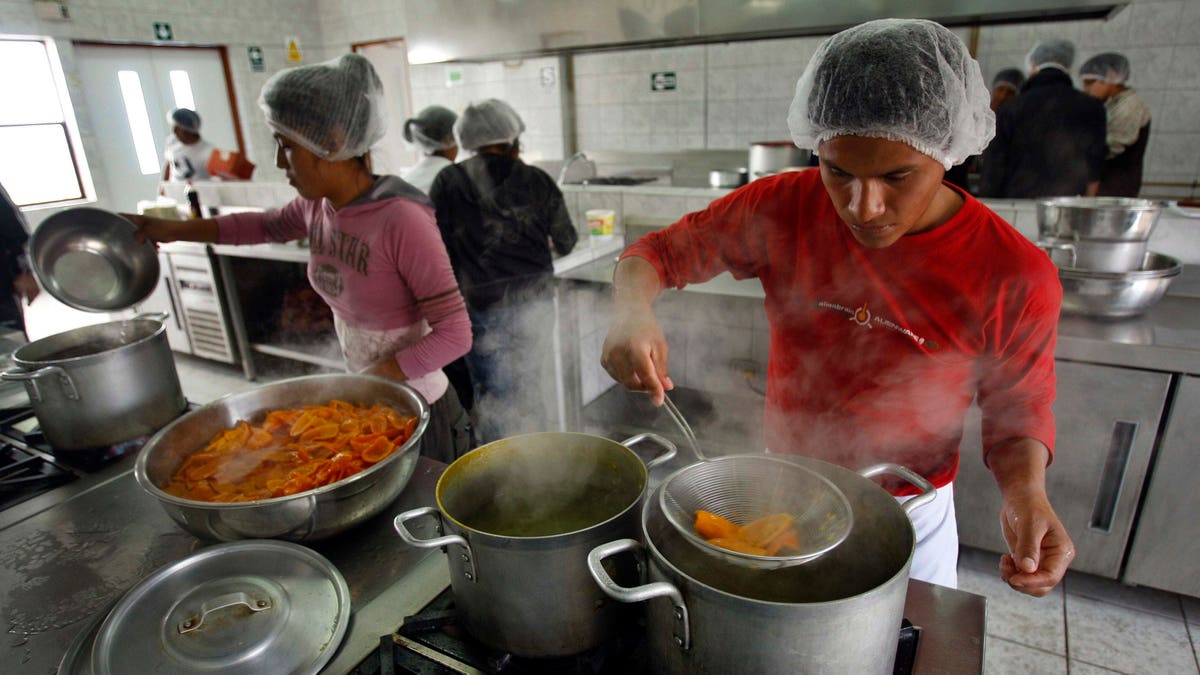
In this photo taken Dec. 18, 2010, students prepare food at the cooking school at Pachacutec vocational institute in Lima, Peru. The school is a 3-year-old cooking school founded for poor students by culinary maestro Gaston Acurio. (AP Photo/Karel Navarro) (AP2010)
Daniel Ramon is living the dream of countless young Peruvians of humble means, learning his way around a kitchen from celebrity chefs who think Peru's immensely popular cuisine can be a vital democratizing force in a land of deep inequities.
The son of a maid and a tire repairmen "who have broken their backs working" so their children might do better, Ramon travels 3 to 4 hours by bus each way to a unique culinary institute in the sands of the poor, coastal north Lima district of Pachacutec, which lacks even running water and sewers.
The 3-year-old cooking school at the Pachacutec vocational institute was founded for poor students by culinary maestro Gaston Acurio, who has spurred excitement globally for Peruvian cuisine, opening more than a dozen restaurants from San Francisco to Madrid.
Acurio says cooks like himself who cater to wealthy palates have a moral duty to help raise living standards in this country where nearly two in five live on less than $2 a day.
To make it work, Acurio enlisted top-flight chefs including Ferran Adria, the Catalan famed for elBulli restaurant on Spain's Costa Brava.
Chefs from Acurio's restaurants also volunteer their time, Lima's municipal water company donates the water, trucking it in and filling the school's five 185-gallon (700-liter) wells. Cooking ingredients are donated by restaurant suppliers. The Roman Catholic church also kicks in funding.
While Peruvians of more favorable provenance pay upward of $700 per month to attend such renowned culinary schools as a Cordon Bleu affiliate or San Ignacio University, Ramon pays $30 a month for a gastronomic education every bit as demanding.
"As a cook I'll have more of a chance to get a good job, better recognition, treatment and pay," Ramon, 22, says between classes. He dreams of travel — a near impossibility if not for this opportunity — "so I can sample new flavors and create dishes of my own."
Efforts to leverage Peru's gastronomical wealth to produce a more equitable society have a long way to go, however.
A study by the Peruvian Gastronomy Society found that most of the country's chefs earn about $500 a month. It's the fate that awaits all but a fraction of the 50,000 students that the society's president, Mariano Valderrama, says are currently enrolled in cooking schools.
An anthropology professor at Lima's Catholic University, Carlos Aramburu, says culinary work alone won't eliminate poverty, "but it is helping to create small, integrated economies, for example, between restaurants, potato growers, fishermen, taxis and hotels."
"This is something that mining, the country's most important export industry, doesn't achieve," he says.
Peru's cuisine fuses native traditions with European, African and Asian influences, distinguishing itself chiefly through an abundance of fresh, unique ingredients, including a wealth of seafood from the Pacific's chilly Humboldt Current.
Acurio, 43, has been its chief evangelist since graduating from Cordon Bleu in Paris and returning in 1994 to open his first restaurant, "Astrid & Gaston." He's now got nearly 30 eateries at home and abroad. They include "La Mar" seafood locales in Brazil, Colombia and Mexico City.
The son of a former prime minister, Acurio's celebrity is unmatched at home. Passionate about promoting Peruvian cuisine, he constantly talks up Pachacutec as well as a new project he wants to launch: a university of gastronomic sciences in southern Lima open to all social classes.
For his part, Adria has expressed astonishment at how food industry careers have suddenly become so desired by young Peruvians. Rather than aspiring to be soccer stars, he says, they want to be chefs.
As part of their schooling, second-year students at Pachacutec are given part-time work at Acurio's restaurants around Lima.
Ramon, 22, does prep work once a week at Acurio's T'anta at the edge of an olive tree-laced park in Lima's upscale San Isidro district, routinely chopping up 140 pounds (65 kilos) of onions per shift. The tears he sheds doing so are of appreciation, he says.
So popular is the two-year Pachacutec program that it gets 500 applications a year, accepting only 40 students. Its first class graduated nine in 2009 — and all have jobs.
"Here we don't just learn how to cook but we also take care of the water, which is scarce, and the plants. Each student is responsible for two plants," said Yovani Palomino, a 21-year-old now in her final semester. The olive bushes are cultivated for their fruit, much of which is pressed into oil.
The surrounding desert sands of Pachacutec, home to more than 100,000 people, constantly invade the school's simple cement buildings. The district is so poor that a 2008 World Food Program study deemed a fifth of its children anemic.
Yet the institute is one of the very few in Peru where renowned chefs come to hold seminars. The school's library, housed in a metal shipping container, boasts more than 2,500 cookbooks that were sent from Spain by chefs including Adria and Andoni Aduriz.
There are certainly no slackers among the students, whose chores at school include cleaning its classrooms and bathrooms, washing the windows and mopping the floors. And then they're off to their various internships.
Palomino, who lives in Pachacutec in a cramped home with seven siblings, embraces the hard work.
"Now, I wash dishes in a restaurant, and I'm only just beginning my internship," she says. "But I'll go far."
Writer Frank Bajak contributed to this report from Bogota, Colombia.
Based on reporting by The Associated Press.
Follow us on twitter.com/foxnewslatino
Like us at facebook.com/foxnewslatino
